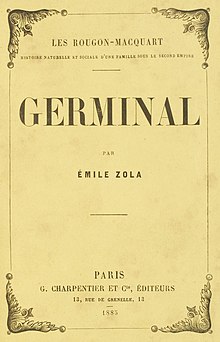
"You see, the worst of it is when you admit that it can’t ever change. When you are young you think happiness will come later on, and you hope for things; and then the same old poverty gets hold of you and you are caught up in it . . . Now I don’t wish anyone any harm, but there are times when the injustice of it makes me mad.
"And then, if only there were some truth in what the priests say, if only the poor of this world were rich in the next . . . no, when you're dead, you're dead . . . so there it is, we're done for."
Depressing, isn't it? These lines are from a novel by nineteenth French author Emile Zola called Germinal. Written amidst the enormous labor upheavals in the Industrial Revolution, Germinal captures the plight of the ordinary laborer who, trapped in the grip of the owner's control over almost every aspect of his life, feels totally bereft of hope. Even if there is an afterlife.
Physical pain and feelings of political impotence indeed make for a raw existence. And when these are compounded with the pain of thinking that even the remedy of an afterlife is not forthcoming, we are left with very few options with which to live a meaningful life. Although Viktor Frankel in his classic Man's Search for Meaning, his analysis of the mental postures of those who survived the Nazi death camps, demonstrated that regardless of one's circumstances, people will continue to strive for hope and meaning, the absence of an afterlife notwithstanding, one still wonders: where does it all end up?
If we say that we live in a meaningless material vacuum, we have no satisfying answers to this question. But if we say that we live in a world pervaded by supernatural thought and destiny, we do not always have satisfying answers, either.
Herein is therefore the confounding point: answers cannot exist without purpose, and purpose cannot exist without God.
How much are we willing to trust?
No comments:
Post a Comment